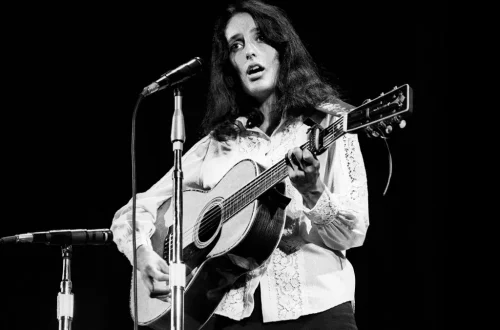In the pantheon of musical activists, few have wielded their voices as poignantly and powerfully as Joan Baez. With her crystalline soprano and steadfast convictions, Joan Baez transformed the folk music scene into a resonant platform for civil rights advocacy. Emerging in the early 1960s, a period brimming with social upheavals, Baez not only became a musical icon but also a towering figure in the struggle for equality and justice.
Joan Baez’s approach to folk music was revolutionary. Her songs—infused with messages of peace, justice, and human rights—became anthems that underscored the civil rights movements and rallied people together. From performing in front of a massive crowd at the March on Washington to touring relentlessly to oppose segregation, Baez utilized her music not merely as entertainment but as a formidable tool for social change. Her relentless commitment to these causes mirrored the sentiments of a generation striving for a new social order, making her music a soundtrack to the transformative movements of her time.
The Power of Song in Social Movements
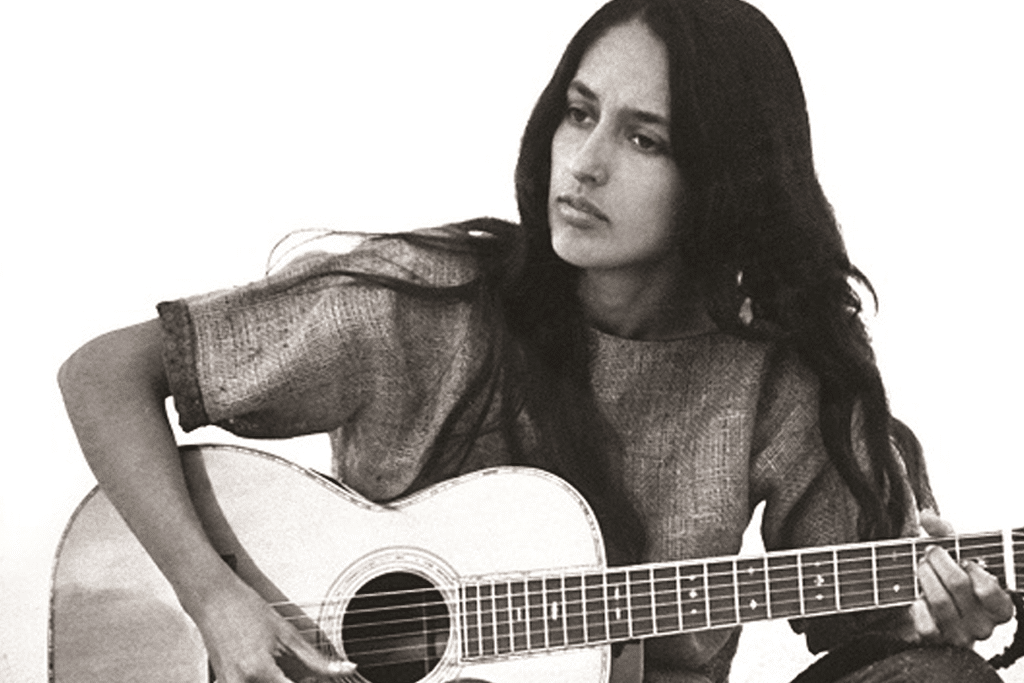
Music has long served as a dynamic force in social movements, providing not just a backdrop but a rallying call for change. From the protest songs of the American labor movements in the early 20th century to the freedom songs that underscored the civil rights struggles, music has had the power to unite, inspire, and mobilize individuals by encapsulating shared emotions and aspirations. It’s within this rich tradition that Joan Baez’s contributions to folk music and activism find their roots and resonance.
The Role of Folk Music
Folk music, in particular, holds a special place in the annals of protest music due to its inherent qualities. This genre is fundamentally accessible—a quality that Joan Baez harnessed expertly. Its simple melodies and repeatable lyrics allow messages to be grasped and shared easily, spreading from person to person and community to community. Historically, folk music has been the music of the people; its narratives often reflect societal struggles, tales of injustice, and the collective hopes of the common man. This accessibility and relatability made it the perfect vehicle for the dissemination of protest themes.
Moreover, folk music often invokes a sense of historical continuity, linking current struggles with past grievances and victories, which can provide a powerful sense of solidarity and purpose. Joan Baez, with her emotive delivery and pure voice, could capture the emotional nuance of a protest song, transforming it from a simple tune into a powerful anthem of resistance and hope. Her performances often served not only as entertainment but also as communal experiences where collective grievances were aired and communal bonds were strengthened.
Through her music, Baez did not merely echo the sentiments of her era; she amplified them, using her platform to challenge the status quo and advocate for a fairer, more just society. Her strategic use of folk music extended its reach beyond traditional audiences, tapping into the mainstream and bringing the messages of the civil rights movement to a broader audience. This strategy highlighted the unique role of music in movements for social change—it can transcend barriers, connect disparate groups under a common cause, and galvanize individuals into collective action.
Joan Baez’s Activism Unfolds
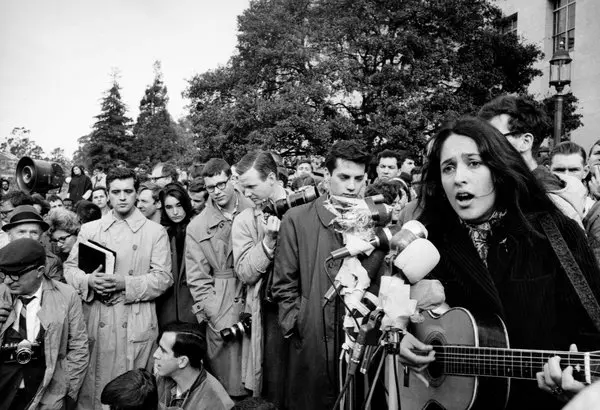
Joan Baez’s career is a chronicle of her commitment to civil rights, each song and performance a testament to her dedication to justice and equality. Throughout the tumultuous 1960s and beyond, Baez not only sang about change but actively participated in the movements that sought it. Her music became both a symbol and a tool of the civil rights era, resonating with the hearts of those who sought reform and echoing the sentiments of a generation fighting for a better world.
Baez’s Activism
One of the most iconic moments of Baez’s activism unfolded during the March on Washington in August 1963. Standing on the steps of the Lincoln Memorial, Baez sang “We Shall Overcome,” a song that had become an anthem of the civil rights movement. Her performance before hundreds of thousands of peaceful protesters highlighted her role not just as a musician but as a vital voice in the struggle for civil rights. The event itself was a pivotal moment in American history, and Baez’s involvement underscored her commitment as much as it amplified the message of the march.
Beyond grand stages, Joan Baez’s activism was marked by her consistent presence at grassroots movements and protests. She was a fixture in the Free Speech Movement in Berkeley and frequently participated in anti-Vietnam War demonstrations. Her refusal to pay taxes that funded the war and her arrest in 1967 during a blockage of the military induction center in Oakland illustrated her willingness to put her principles above her personal freedom.
Baez also brought her activism to the segregated South, where she performed in places where racial tensions were dangerously palpable. In 1961, she performed in Nashville at the Highlander Folk School, an integrated audience that was rare and risky at the time. Her tours across the southern United States were part of her commitment to racial equality, using her concerts as platforms to challenge segregation and support local civil rights efforts.
Perhaps less visible but equally impactful was her support for Dr. Martin Luther King Jr., whom she often joined on civil rights campaigns and marches. Her ability to draw crowds and media attention was a strategic boost to the civil rights movement, highlighting the crucial overlaps between cultural influence and political activism.
Songs as Statements
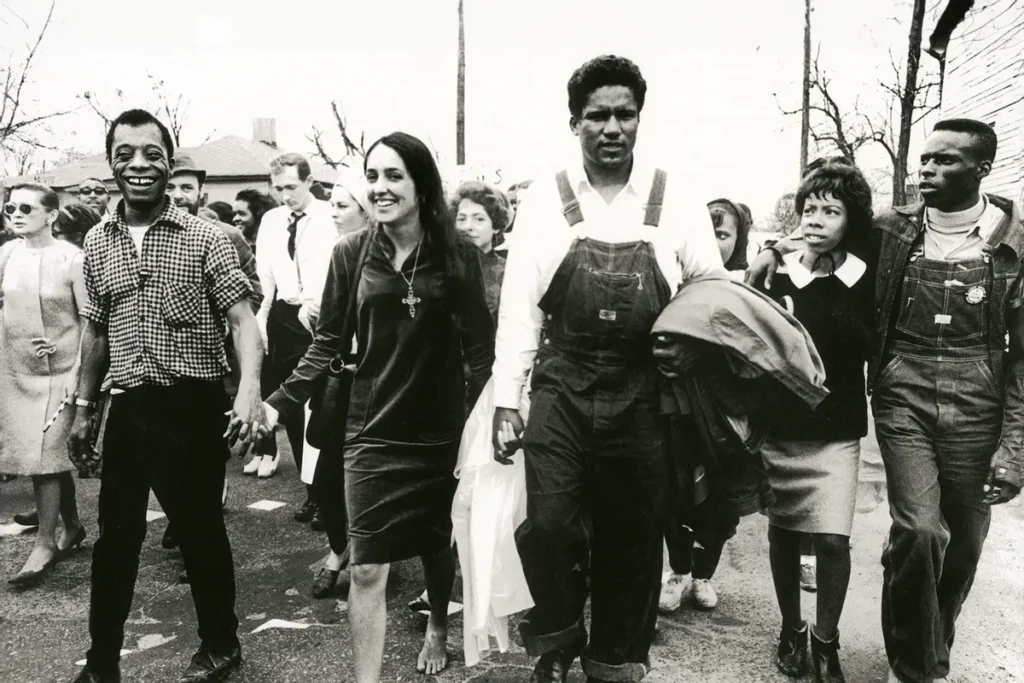
Joan Baez’s repertoire is rich with songs that speak to the heart of civil rights issues, turning her musical performances into powerful acts of political expression. Two particularly resonant pieces, “We Shall Overcome” and “Birmingham Sunday,” exemplify her ability to use music to comment on and influence the social dynamics of her time.
“We Shall Overcome”
Originally a gospel song that became a protest song and a key anthem of the Civil Rights Movement, “We Shall Overcome” was powerfully rendered by Joan Baez during the March on Washington. This song’s lyrics are simple yet profound, speaking directly to the spirit of resilience and hope: “We shall overcome, we shall overcome, we shall overcome someday; Oh, deep in my heart, I do believe, we shall overcome someday.”
Baez’s rendition, with its clear, earnest delivery, helped to elevate the song from a movement chant to a national cry for justice. Her performance not only shared the message with a wider audience but also imbued it with a deep emotional resonance, reinforcing the song’s role in galvanizing activists and sympathizers alike.
“Birmingham Sunday”
Written by Richard Fariña and popularized by Baez, “Birmingham Sunday” directly addresses the 1963 16th Street Baptist Church bombing in Birmingham, Alabama, where four young African American girls were killed by a bomb planted by white supremacists. The song is a haunting portrayal of the tragedy, capturing both the innocence of its victims and the horror of the event: “And the choir kept singing of Freedom, The church bells tolled and the children cried,” illustrating the stark juxtaposition of a peaceful Sunday service turned scene of violence. Baez’s delivery of this song brought a poignant and urgent call to the nation’s conscience, pushing the public to confront the brutal realities of racial hatred and injustice.
The impact of these songs on the civil rights movement was profound. “We Shall Overcome” became an anthem for peace and persistence, ringing out from marches and meetings, instilling courage and solidarity among protesters. Meanwhile, “Birmingham Sunday” served as a somber reminder of the costs of hatred and the urgent need for change, making the civil rights struggle deeply personal for listeners far removed from the violence of the South.
Strategic Collaborations
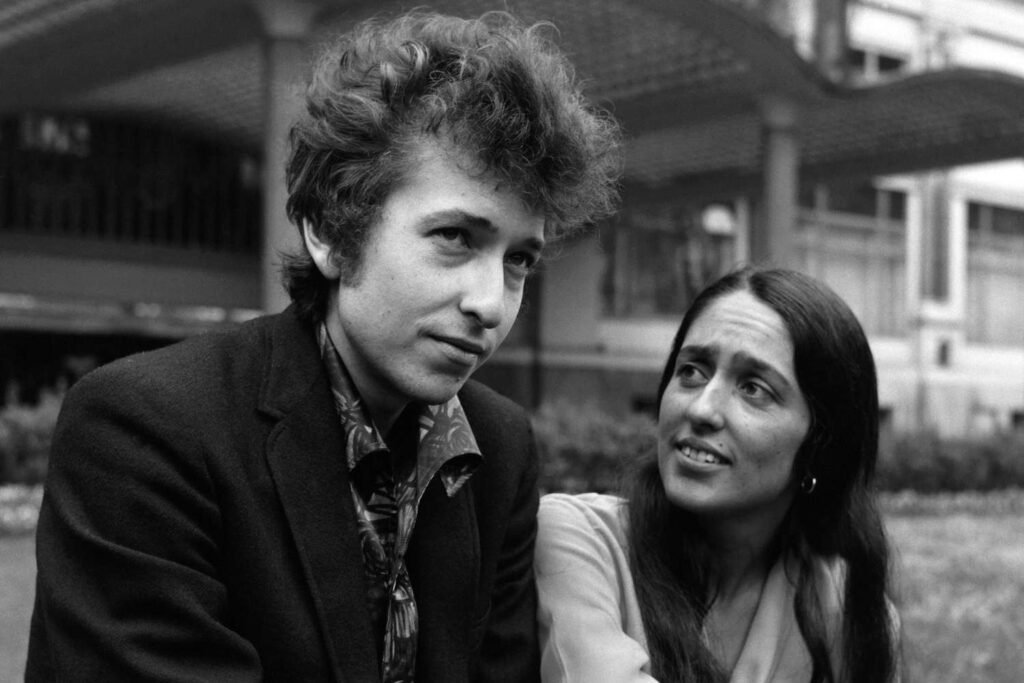
Joan Baez’s effectiveness as a civil rights activist was significantly enhanced through her strategic collaborations with other influential figures in the movement. These alliances not only amplified her impact but also helped weave her music more deeply into the fabric of the movement’s message.
Collaboration with Martin Luther King Jr.
Joan Baez’s partnership with Dr. Martin Luther King Jr. stands out as a cornerstone of her activism. Baez joined King in several key moments of the civil rights movement, including the legendary March on Washington in 1963. By aligning herself with King, Baez brought substantial attention to civil rights issues through her music and public appearances.
Her presence at civil rights rallies, where she often performed before King spoke, not only set the tone for these events but also drew media coverage that might not have been as intense without her star power. This synergy between Baez and King exemplified how art and activism could unite to catalyze social change, as her music helped to disseminate King’s message of nonviolence and equality to a broader audience.
Partnership with Bob Dylan
Baez’s relationship with Bob Dylan also significantly impacted her role in civil rights. Dylan, known for his poignant and powerful songwriting, found a vocal advocate in Baez who was instrumental in introducing him to a wider audience in the early 1960s. Their performances together combined her clear, piercing vocals and his raw, narrative songwriting, creating a compelling call to action for social justice. Songs like “Blowin’ in the Wind” and “The Times They Are a-Changin’” became anthems of the civil rights and anti-war movements, partly due to Baez’s influence and endorsement. This partnership not only fortified her music’s message but also helped Dylan’s protest songs resonate more deeply with the public, further extending the reach of their activism.
Influence on Other Musicians and Activists
Beyond these direct collaborations, Baez’s involvement in civil rights influenced numerous other musicians and activists. Her example encouraged other artists to use their platforms for social commentary, effectively broadening the impact of music as a tool for change. Musicians inspired by Baez often adopted similar themes in their own work, contributing to a rich tapestry of protest music that continued to inspire action for civil rights and beyond.
Legacy of Activism Through Music
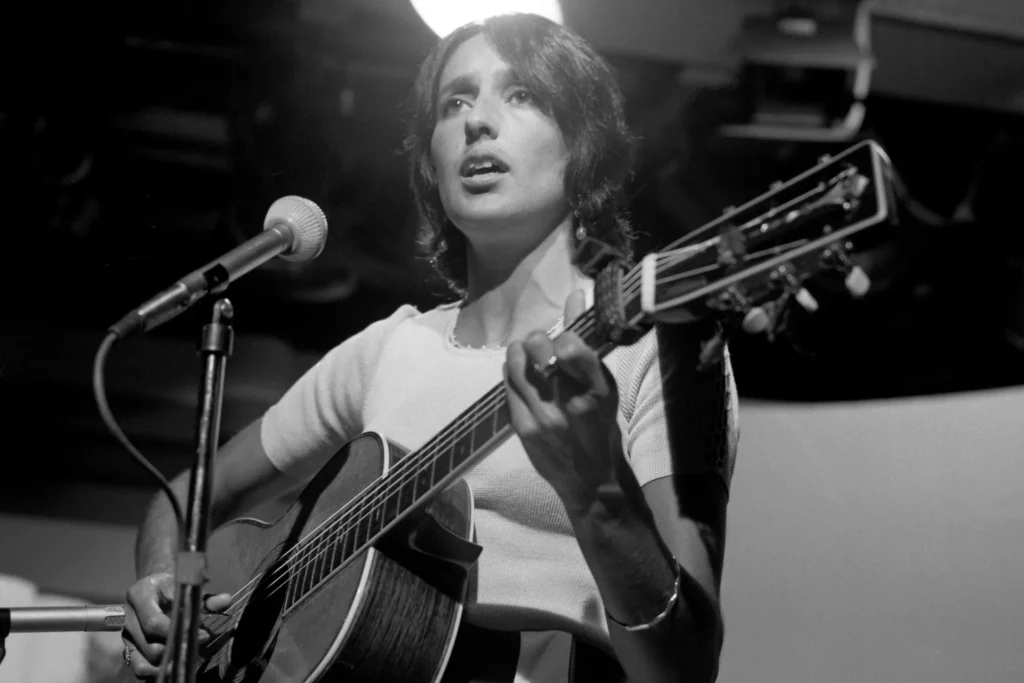
Joan Baez’s indelible mark on the landscape of music and social activism has resonated through the decades, influencing not only her contemporaries but also successive generations of musicians and activists. Her legacy is a testament to the enduring power of music as a tool for social change, inspiring others to use their artistic talents for advocacy.
Influence on Musicians
Many artists have cited Joan Baez as a critical influence in their decision to merge music with social and political activism. Her ability to convey deep, resonant messages through her music set a standard for artists like Tracy Chapman, Ani DiFranco, and Bruce Springsteen, who have all followed in her footsteps, using their voices to address social issues. These musicians, and many others, have adopted Baez’s model of integrating personal conviction with public performance, ensuring that protest music remains a vital part of the cultural response to social injustices.
Adoption by Modern Social Movements
Baez’s approach to activism—leveraging her visibility and influence—has been mirrored in modern social movements. For example, the role of music in the Black Lives Matter movement echoes Baez’s use of song to unify and mobilize. Artists today often release songs in response to contemporary issues, using streaming platforms and social media to reach global audiences instantly—platforms Baez did not have but whose foundational tactics she helped set. Her example demonstrates the effectiveness of combining art and activism to amplify a movement’s reach and impact, a strategy widely adopted in today’s digital age.
Continued Relevance
Even in her later years, Joan Baez continued to inspire activism, showing that commitment to social causes is a lifelong journey. Her farewell tour and recent performances often addressed contemporary issues, reminding audiences of the ongoing need for vigilance and action in defending human rights. Her enduring appeal and continued relevance provide a model for aging artists, demonstrating that their voices remain vital in the fight for justice and equality.
The legacy of Joan Baez’s activism through music is a bridge from the past to the present, continually influencing how artists and activists engage with the world’s challenges. Her life and work underscore the potent combination of artistry and advocacy, a blueprint that remains effective as new generations seek to make their own change through music.
